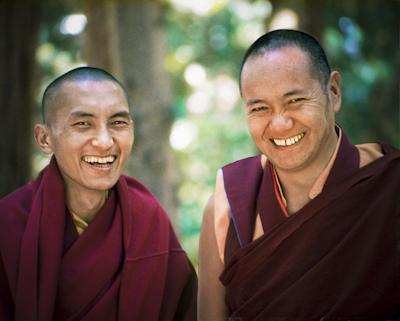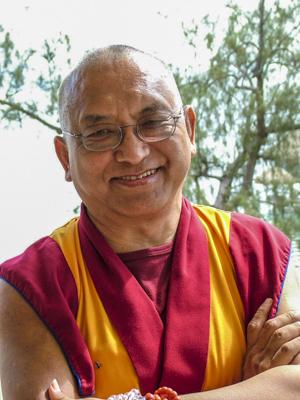E-letter No. 17: August 2004

Dear Friends,
Thank you so much for subscribing to our monthly e-letter. We appreciate your reading it and your support of the Lama Yeshe Wisdom Archive. As I always say, please forward this to any friends or relevant lists…we’d welcome more readers.
First, I would like to offer a warm welcome to our wonderful new customer service person, Sonal Shastri. We are very happy that she has joined us in our work of making Dharma teachings freely available.
In that vein, we are pleased to announce another extensive teaching posted to our Web site for all to see and read: Lama Zopa Rinpoche’s Practicing the Good Heart. We have also posted a teaching by His Holiness the Dalai Lama on the four noble truths to our members' area.
And speaking of the members’ area, since we launched our membership drive—looking for people prepared to offer $1,000 for a membership in the Archive—a couple of people have expressed concern over the way we’re going about it—in particular, the benefit members receive of access to selected teachings in an exclusive members’ area. In case others might have similar qualms, I thought I’d share with you what one of them said and what I replied. If you would like to read this exchange, please go here.
The essence is, however, that almost everything we do we provide free of charge, and the teachings that are presently found in the members’ area will eventually be published for all to read. The fact is that we greatly appreciate the exceptional support our members give us because it is allowing us to hire more editors to prepare more teachings for the benefit of all.
In the meantime, we still need many more members, and upon several supporters’ request we have decided to make it easier for more people to join by offering a range of installment plans. Rather than having to pay $1,000 right away, you can now become a member of the Lama Yeshe Wisdom Archive by
1. Having us deduct $100 a month from your credit card for 10 months or
2. Having us deduct $50 a month from your credit card for 20 months or
3. Offering us a dollar a day ($30 monthly off your credit card) for 1,000 days (34 months).
Please see our membership information page for the benefits of membership, and send an email to [email protected] to arrange for automatic debits.
Thank you so much. And now the really good part follows!
Much love,
Nick Ribush
Director
The Benefits of Bodhicitta
From the holy speech of the great bodhisattva, Shantideva,
Those who want to destroy countless samsaric sufferings, alleviate the unhappiness of sentient beings, and enjoy a multitude of joys as well, should never abandon bodhicitta.
[Bodhicaryavatara, Ch.1, V.8.]
This means that if you want to destroy, or alleviate, your own hundreds of samsaric sufferings you must always practice Buddhadharma. Moreover, if you also want to free other sentient beings from unhappiness, from suffering, you need bodhicitta as well. Furthermore, if you want to receive the hundreds of happinesses of upper rebirth—as a human or a samsaric god—or the happiness of nirvana, the cessation of samsara, or especially the happiness of enlightenment, you should never give up bodhicitta. For success in attaining any of these goals, you must always keep bodhicitta in your heart. You should never give up bodhicitta. This is the instruction of the great bodhisattva Shantideva for those who want to accomplish any of these aims.
However, whenever we read or listen to teachings or do meditation or any other spiritual action, we should do so with one of these goals in mind. And if we do have such aims, why—the experienced bodhisattva Shantideva asks—don’t we practice bodhicitta? Since we have the time and mental capacity, and since it is necessary to train our minds in bodhicitta as much as possible, before we die, in whatever time we have left, we should try to engage in this practice as much as we can.

We are very lucky, greatly fortunate, having even a minute’s chance of training our mind in this way. Even a minute’s meditation on bodhicitta makes the arrangement for us to practice it again in future lifetimes and approach the higher paths. Just think how many people there are in all the countries on Earth. Now think how many of them practice and train their minds in bodhicitta. Very few; they’re extremely rare. And this is just talking about people, human beings; not other sentient beings.
People who live in irreligious countries have virtually no chance. Even most of those who live where the teachings exist are unlikely to practice bodhicitta. Those who really train their mind in bodhicitta are very few, extremely rare. Thinking along these lines can give you great energy to practice; thinking how rare it is that people get the opportunity to train in bodhicitta, try to practice it yourself.
Bodhicitta is a pure thought. Its essence is caring more for others than yourself. This is the opposite of the thought that always puts yourself first, the mind that thinks, “I am the most important of all.” The person with bodhicitta thinks that others are more important. This is the complete opposite of self-cherishing—you always want to sacrifice yourself in order to benefit others, to give pleasure to others, to free others from suffering, to enlighten other sentient beings.
And anybody can practice bodhicitta. It doesn’t depend on your color, caste, race, class or the way you dress. It doesn’t even depend upon your religion—even Christians, Hindus, Muslims, Jews, anybody can practice bodhicitta.
No matter what you are called, you need to develop this pure thought because with it you never give harm to either yourself or other beings; not the tiniest atom of trouble. And besides not giving even an atom of harm, bodhicitta always keeps you and others in peace. With this pure thought in mind there’s no way you can hurt others in any way. Furthermore, anything you do for the benefit others, such as making charity, teaching Dharma and so forth, are all the more pure and sincere; they’re pure since they’re done with the motivation of wanting to release others from problems. The more an action is pure and sincere, the more beneficial it becomes.
Bodhicitta is especially important if you’re serious about desiring world peace. People who achieve bodhicitta can never give trouble to others out of jealousy, pride, avarice or aggression because these minds come from the self-cherishing thought and bodhicitta completely eliminates it. If everybody had bodhicitta world peace would become a real possibility. Peace doesn’t depend so much on action—giving lectures, holding conferences, building things and so forth—because if what is done is tainted by the self-cherishing thought, even though its intention is to bring world peace, it is not pure and it won’t bring peace. If an action is motivated by self-cherishing, delusion, greed or hatred it cannot be pure. Therefore it cannot benefit others that much, it doesn’t have much power to benefit. Also, it can cause complications and suffering.
Anyway, actions done out of the negative mind are not the cause of peace, not the cause of happiness. They cause only suffering for self and others because they are rooted in negativity. Peace and happiness result from positive actions; positive actions arise from a pure mind.
So, if you really want to experience peace and bring peace to everybody on Earth, you should not put so much energy into developing external objects but redirect it into developed and changing the mind—your own and others’. The negative mind is the cause of turmoil and suffering. Work at eradicating this poisonous root of suffering, which reaches deep into sentient beings’ minds, and planting the healing root of happiness, bodhicitta.
This is the quickest, most practical way of bringing peace to the world. Otherwise, even though you spend countless eons working for peace, if you don’t make any change to the root, the creator—living beings’ mind—if you simply put all your effort into external, material development, peace will never result. Not only will you not bring peace to others, you will not bring peace to even yourself. For these things to happen you must eradicate the creator of problems, which lies within your mind. Every problem comes from the mind. This is easy to see if you check correctly.
If one country helps another country, a third country gets upset. This is all created by mind. Upset, confusion, the wish to give harm—all these come from the mind. That’s simple to understand. One person talks, another becomes unhappy or gets angry, jealous or proud, while a third feels neutral, none of these emotions—that also shows that problems do not arise from external phenomena.
Problems are in the mind; they arise from the mind. Therefore, if you don’t want to experience anger, jealousy or any other kind of suffering, the solution is not to kill the other person but to kill the negative mind; to clean or destroy the negative mind. The whole thing boils down to this: finding peace does not depend on harming or destroying other beings. It never depends on that; it is impossible to bring peace in that way. Peace can arise only from cleaning the negative mind.
People always talk about world peace—of course, I’m not so sure that their minds are as sincere as their words sound—but if you listen to what they say, people want the world to be free of trouble and suffering. So, if you want to work for that, first you must bring peace to yourself. If your mind is full of dirt, how can you clean the minds of others?
Therefore, you have to understand the methods of cleaning your negative mind. Then, by practicing these and cleaning your own mind, you’ll know how to help others clean theirs in a practical way. Going about peace in this way can only bring benefit. Otherwise, no matter how you try, you’ll always make mistakes in whatever you do.
Lama Zopa Rinpoche gave this teaching at the Sixth Meditation Course, Kopan Monastery, Nepal, in March 1974. Edited from the Lama Yeshe Wisdom Archive by Nicholas Ribush. Read the entire transcript of the sixth course online.
